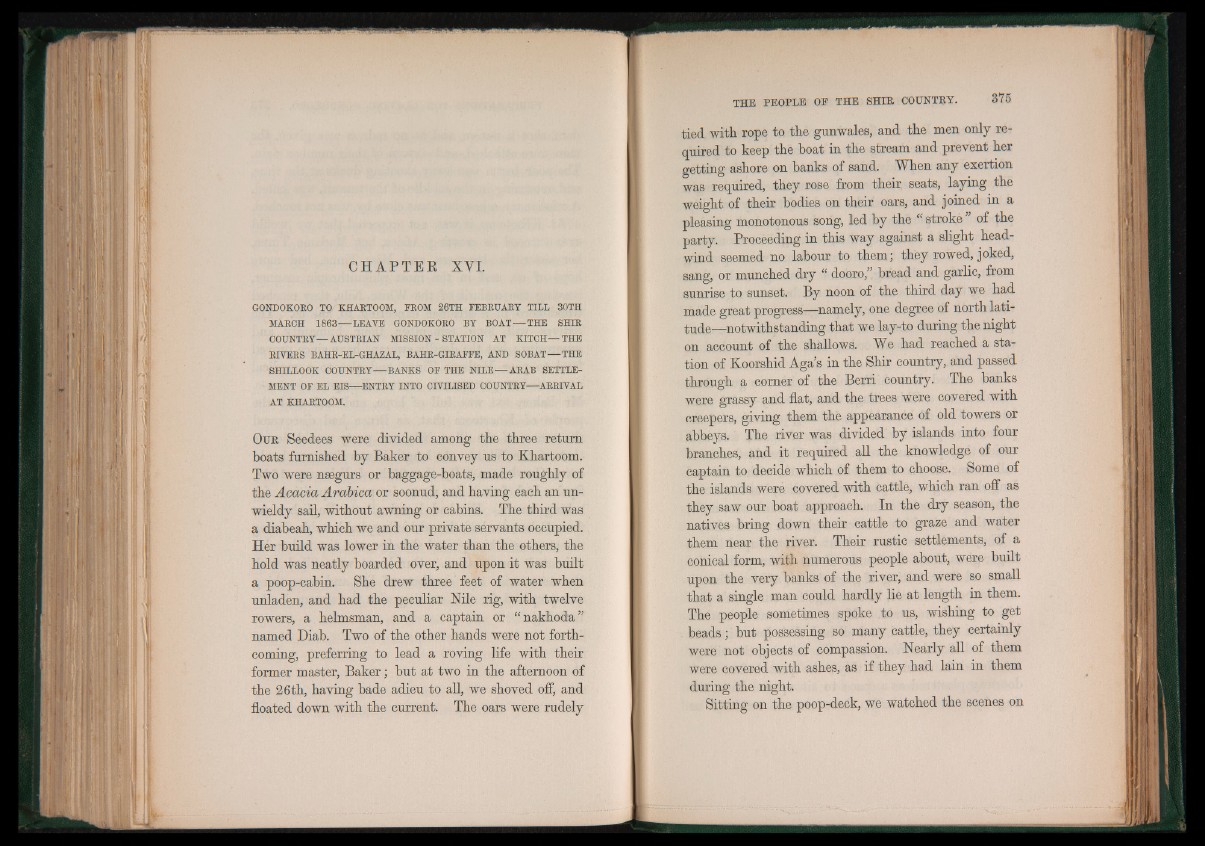
C H A P T E E XYI.
GONDOKORO TO KHARTOOM, FROM 26TH FEBRUARY TILL 30TH
MARCH 1863— LEAVE GONDOKORO BY BOAT— THE SHIR
COUNTRY— AUSTRIAN MISSION - STATION AT KJTCH— THE
RIVERS BAHR-EL-GHAZAL, BAHR-GIRAEEE, AND SOBAT— THE
SHILLOOK COUNTRY— BANKS OF THE NILE— ARAB SETTLEMENT
OF EL EIS— ENTRY INTO CIVILISED COUNTRY— ARRIVAL
AT KHARTOOM.
Our Seedees were divided among the three return
boats furnished by Baker to convey us to Khartoom.
Two were nsegurs or baggage-boats, made roughly of
the Acacia Ardbica or soonud, and having each an unwieldy
sail, without awning or cabins. The third was
a diabeah, which we and our private servants occupied.
Her build was lower in the water than the others, the
hold was neatly boarded over, and upon it was built
a poop-cabin. She drew three feet of water when
unladen, and had the peculiar Nile rig, with twelve
rowers, a helmsman, and a captain or “ nakhoda”
named Diab. Two of the other hands were not forthcoming,
preferring to lead a roving life with their
former master, Baker; but at two in the afternoon of
the 26th, having bade adieu to all, we shoved off, and
floated down with the current. The oars were rudely
tied with rope to the gunwales, and the men only required
to keep the boat in the stream and prevent her
getting ashore on banks of sand. When any exertion
was required, they rose from their seats, laying the
weight of their bodies on their oars, and joined in a
pleasing monotonous song, led by the “ stroke ” of the
party. Proceeding in this way against a slight headwind.
seemed no labour to them; they rowed, joked,
sang, or munched dry “ dooro,” bread and garlic, from
sunrise to sunset. By noon of the third day we had
made great progress—namely, one degree of north latitude—
notwithstanding that we lay-to during the night
on account of the shallows. We had reached a station
of Koorshid Agas in the Shir country, and passed
through a corner of the Bern country. The banks
were grassy and flat, and the trees were covered with
creepers, giving them the appearance of old towers or
abbeys. The river was divided by islands into four
branches, and it required all the knowledge of our
captain to decide which of them to choose. Some of
the islands were covered with cattle, which ran off as
they saw our boat approach. In the dry season, the
natives bring down their cattle to graze and water
them near the river. Their rustic settlements, of a
conical form, with numerous people about, were built
upon the very banks of the river, and were so small
that a single man could hardly lie at length in them.
The people sometimes spoke to us, wishing to get
beads; but possessing so many cattle, they certainly
were not objects of compassion. Nearly all of them
were covered with ashes, as if they had lain in them
during the night.
Sitting on the poop-deck, we watched the scenes on